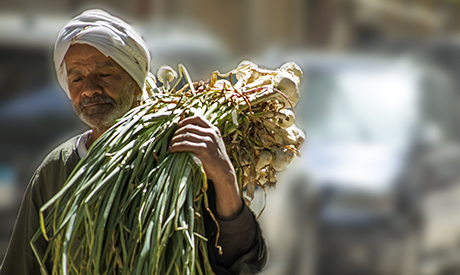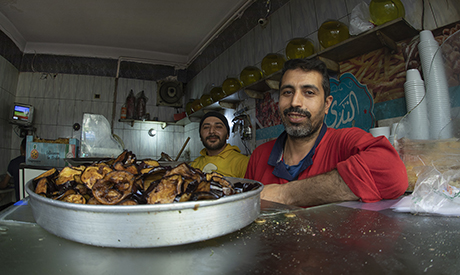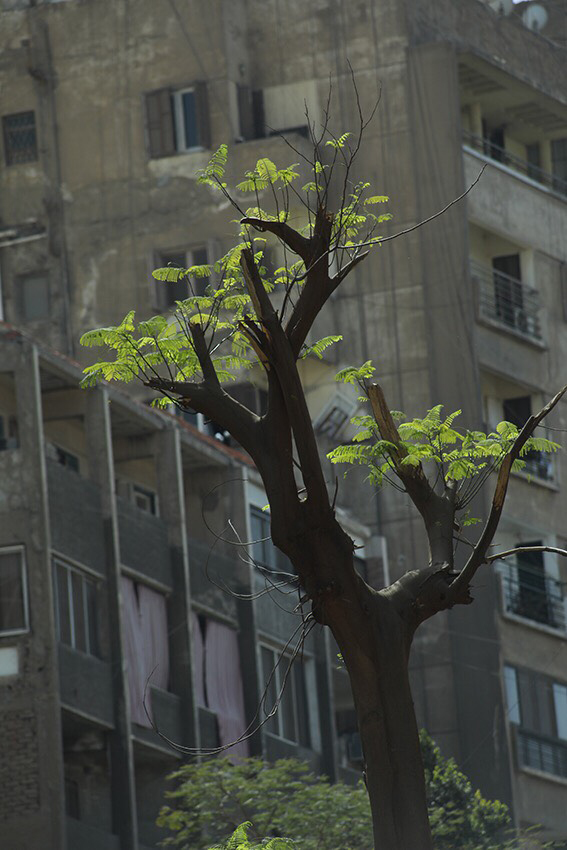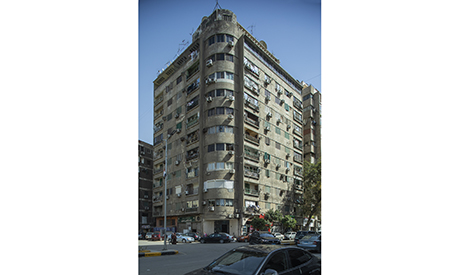It is effectively an island in the Nile in the heart of the city, connected to Cairo and Giza by parallel bridges. However, Manial Al-Roda is also one of the most vivid neighbourhoods of the capital, owing to its considerable population density and commercial, academic, and cultural activities that make it vibrant and intense.
“It is also a very intimate neighbourhood,” said Marwan Fawzi, a professor at the Faculty of Music Education in Cairo.
Having studied the diversity of the sounds of the city, Fawzi describes the vocal topography of Manial Al-Roda. Starting a three-hour stroll through the neighbourhood, he soon identifies the first underlying voice.
“The birds are singing. There is no way one can miss the sound of the birds. It is clearer on the streets right next to the Nile, but you can hear it all over,” he said.
Fawzi started the stroll on Mathaf Al-Manial Street not far from the now deserted Cinema Faten Hamama at the corner of Manial and Mathaf Al-Manial streets. Having been Cinema Miranda for the best part of the 20th century, this movie theatre was once a favourite outing for the residents of the neighbourhood, both for Friday matinees in winter and soirees in summer.
In the 1970s, the cinema lost much of its aura. However, it was renovated and reopened in 1984 as Cinema Faten Hamama to honour an actress who was an icon of the Egyptian silver screen. But decline was to hit again, and shortly after Hamama herself passed away in January 2015, the cinema was closed and offered on the real-estate market as a potential lot that could allow for a high-rise building overlooking the Nile.
“This would be devastating, especially for the visual character of the neighbourhood, already marred by the construction of unfitting high-rise apartment buildings that seem out of place in this neighbourhood rich in art-deco architecture. There are also the trees that have kept the birds in the neighbourhood,” Fawzi said.
Manial Al-Roda — “the paradise of the Nilometer” — has certainly lost a considerable part of its architectural heritage. A few gems, however, have survived, including the Manasterly Palace that now acts as a venue for cultural activities, especially music performances.
“Music can be easily heard throughout the smaller streets of this neighbourhood anyway — it comes from the radio of a little store, from the balcony of a ground-floor apartment, or from a car passing with the music coming out of it. There are even a couple of studios where prominent singers of the 1990s have recorded their songs,” Fawzi said. “This is why I call it an intimate neighbourhood, because it is a place where you can hear familiar sounds,” he said.
As Fawzi walks down Mathaf Al-Manial, he takes a left at a smaller street where the art-deco apartment buildings have survived, even if they have not aged very well. During the past few decades, the neighbourhood has lost a considerable part of its economically privileged socio-economic segments, and it is not always within the means of its new residents to look after the architectural heritage.
However, according to Fawzi, the less economically privileged community of the island has given the neighbourhood a particular flavour.
“This is still one neighbourhood where one can walk by an Egyptian fast-food restaurant and hear the noise of the potatoes and eggplants as they go into the frying pan, or come across vendors who call out to sell their commodities. It is exactly the antithesis to the gated communities that are stripped of this vocal beauty,” Fawzi said, moving through the quieter Ahmed Mokhtar Hegazi, Hadi Al-Gazzar, Mohamed Nada, and Ali Al-Sherif streets in a sequence of left and right turns.

RESIDENTS: Mahmoud, a butcher who has been living in the neighbourhood since his family moved from the Delta some 40 years ago, said it was particularly in Ramadan that the vocal character of the neighbourhood comes to life.
“In the morning it is rather quiet until it is time for noon prayers. Then it is all types of noise really — people coming and going and stores being opened and shoppers stopping by. By the afternoon there is more noise, especially on Manial Street next to the Ramadan shopping destinations: the local bakery where people buy qatayef (folded pancakes) and konafa or simply bread for Iftar,” Mahmoud said.
“Then it is time to listen to the sounds of the Quran recitation coming from almost every building, and then the noise of the cars starts to dissipate, and it is more the sound of silence and the sound of birds while awaiting the call for the sunset prayers to break the fast,” he added.
During Iftar, there is hardly a sound to be heard on the streets. “This is particularly the case during the first week, when people would be mostly having Iftars at home,” Mahmoud said. Then, he added, “comes the most delightful part of the day with the call for the evening prayers.”
Taraweeh, the extended version of the evening prayers, are not traditionally performed through loudspeakers. However, in some mosques across Cairo it has been the tradition during the past couple of decades for the full prayers to be performed through loudspeakers.
This might not be to the liking of everyone, but it is certainly to the liking of Abbas, an older resident of the neighbourhood and a retired civil servant. Abbas said that for him Ramadan is identified with the taraweeh prayers in the evening. “It is this sound, coming after two hours of almost complete silence, that marks Ramadan really, and it is just so delightful from beginning to end,” he added.
Manial Al-Roda has a good number of older and newer mosques, and throughout the month of Ramadan it is easy, given the small size of the streets, to hear the prayers being echoed throughout the neighbourhoods. “It was such a pity that taraweeh was suspended last year because of the coronavirus. It was as if there was no Ramadan — everything was so quiet. Ramadan evenings are not supposed to be quiet,” Abbas said.

Certainly, this neighbourhood is no longer the quiet one it used to be in the first half of the 20th century. Walking onto Manial Street, Fawzi has to speak up so his voice can be heard in the heavy traffic.
All types of noise and sounds are in evidence: the horns of frustrated drivers; the voices of people shouting on their cell phones; the occasional vendor; people shouting taxis down; and the noise of old and ailing public buses and more.
On a Ramadan morning, Fawzi said, the noise is reduced significantly. “At least during the first half of the day, a great deal of these activities would not have started on a Ramadan morning — the car garage, the loud music from the supermarket, and the fast-food restaurants. This gives a lot more space for the sounds of the birds to be heard,” he said.
Manial Al-Roda, however, is not a neighbourhood with a unified vocal profile. And it is not just about main roads versus smaller streets. It is also about the northern and southern parts of the neighbourhood.

GEOGRAPHY: Manial is the northern part of the island and the venue of the busy Faculty of Medicine of Cairo University at Qasr Al-Aini.
The huge medical complex that also has one of the biggest and most reputable hospitals in Egypt is built around the large palace of a notable of the 15th century. “This is the place where perhaps the sounds of birds are most missed,” Fawzi said.
Al-Roda is the southern part of the island and the part that houses the Nilometer that was once used to measure the waters of the Nile so farmers would know whether to expect a flood or drought.
Fawzi takes a right from Manial Street to head to Al-Malek Al-Saleh Street. He is now walking towards the quietest part.
“We are walking towards an impasse, which is why there are fewer cars and much less noise. This is the direction of the Manasterly Bridge and the Nilometer. Here it gets really quiet — the residents of the apartment buildings on one side of the street overlooking the Nile seem to be at ease with this pristine environment as there is hardly any noise out of the balconies here,” Fawzi said.
Nahed, a doctor in her 50s, used to live on this very street some 25 years ago before she got married and moved out of her childhood neighbourhood to Heliopolis. She used to come back to her old neighbourhood until she lost both parents three years ago.
Every Ramadan, Nahed would come for Iftar with her family at least five times, including on the first day of the holy month. For her, the change of the environment “has not been big”.
“This is a quiet street, and it always was, though more so in the late 1960s and most of the 1970s, when it was not the norm for many people to have private cars and when taxis were fewer. People in general were less stressed, and they did not drive as aggressively as they do today,” she said.
Nahed’s childhood Ramadans were also a lot less noisy than those of the past few years when she last had Iftar at her mother’s in 2018.
The sounds of radio and TV broadcasters and Quran reciters were the main sounds of the holy month. “I don’t remember taraweeh to have been such a big thing before the mid-1980s, or at least I don’t remember my father going to the mosque every evening for this prayer before I graduated in 1984. There were no prayers performed on loudspeakers,” she recalled.
“The call for prayers also used to be a lot more beautiful. Only those with really nice voices would dare to do the call for the prayers, but this is the case across all of Cairo, I think,” she added.
Nahed’s favourite call for prayers during the holy month in her younger years was the one that comes at dawn just a few minutes after she would have rushed to the kitchen to get that last glass of water before the fast started.
“Everything would be so quiet, and then the call for prayers would come almost like a whisper. It would never disturb, and then it would be silence again before the birds started their morning singing,” she recalled.
During her last excursions into her old neighbourhood, Nahed had lamented the serenity that was gone, especially during the month of Ramadan. For Nahed, the beautiful voices of Quranic recitations, the faultless tunes of the calls for prayers, and the exchange of Ramadan greetings among neighbours who would always know one another were part of this serenity.

Manial Al-Roda shows off its fading but ever memorable charm
*A version of this article appears in print in the 15 April, 2021 edition of Al-Ahram Weekly
Short link: